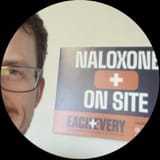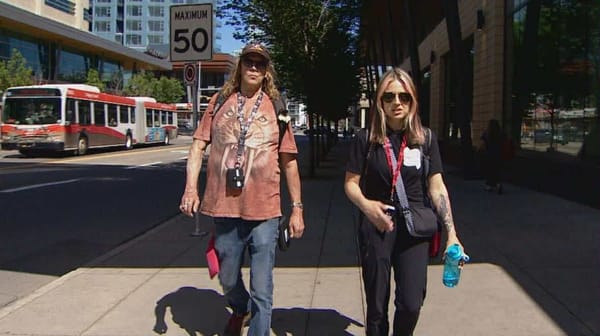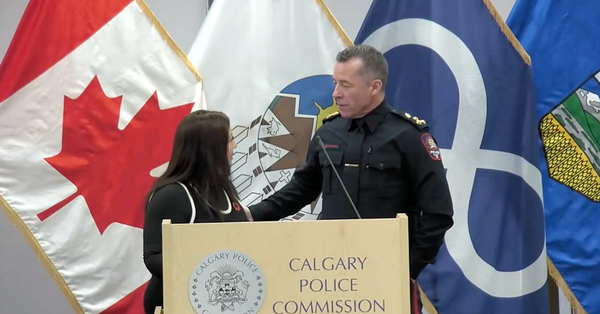City of Recovery
Red Deer city council has made history as the first in Canada voting to close an overdose prevention site. Ignoring decades of research, Mayor Ken Johnston asserted this will set the groundwork for the city to become "free from addiction." People across the country should pay attention.

It was an emotional week in the big-little city wedged halfway between Calgary and Edmonton, as Red Deer city council endorsed a motion to increase policing of people who use drugs and to eliminate their only sliver of refuge from the unregulated drug crisis: the city's overdose prevention site (OPS).
Far from being limited to small-city politics, Red Deer's move signals a federal crackdown on harm-reduction strategies if Pierre Poilievre's Conservatives form government. Having positioned Red Deer as flagship city for the so-called Alberta model, Mayor Ken Johnston declared that to echo its triumph in hosting the 2018 Canada Games, Red Deer will become known as the "City of Recovery."
But while the Alberta government may have sold Mayor Johnston and council on this tagline, their record shows council has instead voted to be a city of corpses.
On February 15, thirty-three people lined up to speak to city council during a public hearing on the city's OPS. Of these, 27 (82%) spoke in favour of keeping the site running.
Many of those 27 poured their hearts out with personal experiences of loss, grief and struggle amid an unregulated toxic drug emergency that they feel the overdose prevention site helps to address. Their trepidation over the potential closing of the site was palpable.
Regardless, on February 16, council revealed their predetermined positions against the site, passing a motion that read:
"Be it resolved that Council requests the Government of Alberta replace the existing OPS by the end of 2025 and in its place position greater harm reducing options within our community that focus on health, wellness, and recovery."
There are three key elements to the motion. The first is the timeline of requesting that the Alberta government close the site by the end of 2025, which was modified from 2024 in the original draft of Councillor Vesna Higham's motion.
The second element is the removal of the site in favour of "greater harm reducing options," Orwellian, given that OPSs are a cornerstone harm-reduction service.
The third element is the language of "health, wellness, and recovery": Red Deer's council is asserting an unfounded belief that drug use and health are mutually exclusive. We'll return to this.
City council provided a full statement on the motion that emphasized, along with the elements above, more policing in the vicinity of the OPS and "increased frontline supports for mental health and addictions to...better address root causes."
Public displays of affliction
The two councillors who spoke against the motion were Dianne Wyntjes and Cindy Jefferies. They should be commended for showing courage against a broader display of political cowardice by their colleagues, as it has been made clear over the last year that the Alberta government has played an active role in the slow dismantling of Red Deer's overdose prevention site.
Councillor Wyntjes spoke passionately about the evidence, asking her fellow councillors: without the OPS, what measures would remain to respond to emergencies like the 23 multidrug poisonings in a single day that recently overwhelmed Belleville's EMS – poisonings that weren't fully treatable with naloxone? (Note to media: please don't use "zombie drug" when referring to xylazine or any other substance, as CBC did in its reporting on this story. Recent research describes how this framing dehumanizes people who use drugs.) Wyntjes pointed out that while the OPS is not without problems, the issues most people are upset about are mainly driven by lack of housing affordability.
Councillor Jefferies gave emotional testimony of substance use dependence in her family. Her central argument was that most people will return to drug use in the weeks or months after 'treatment.' When they do, the OPS is one backstop to keep them safe. She asserted that closing the site will increase harms, not reduce them. (Share your thoughts with these councillors.)
Councillor Lawrence Lee's central argument was that since the OPS didn't single-handedly solve the drug poisoning crisis, the city should abandon it. While emphasizing a "scientific, data-driven approach," he presented no data and rather ignored decades of evidence that OPSs save lives, reduce public drug use & debris, have no measurable impacts on crime or social disorder, and help people connect with additional health services.
"You can correlate anything with anything." -Councillor Lawrence Lee, referring to advocates' use of data-driven arguments to support Red Deer's overdose prevention site.
Councillor Bruce Buruma focused his remarks on building a community "where people can not only get well, but stay well." This is where the UCP's moralistic framing of drug use reared its head, by centring two ideas: that people who use drugs can't be healthy ("get well") and that people's ability to maintain abstinence depends on the absence of drugs from their view ("stay well").
The statement reads as though Marshall Smith, chief of staff to the premier, wrote it himself.
Not even a year ago, Councillor Kraymer Barnstable was caught plotting the closure of Red Deer's OPS with "provincial colleagues." Given his conflicted relationship with the topic, it was surprising to see him vote on this motion, let alone provide comments. Next, owing to faulty streaming connection from the City of Red Deer, Councillor Victor Doerksen's comments were unintelligible. Councillor Vesna Higham, who initially proposed the motion in December, provided deeply moralistic commentary about drug use, essentially ruling out any legitimacy in people's individual choice to use drugs.
Finally, half an hour into his speech punctuated by dramatic pauses and emphasizing his own experience with family substance use, Red Deer's affable Mayor Ken Johnston arrived at his central point: the city would commit wholesale to the spirit of its October 2022 motion that adopted the Alberta government's so-called recovery-oriented system of care. That means more police, more 'treatment,' and fewer options for people who use drugs.
Johnston emphasized that their "hurting city" would become "free of addiction – we will be free," echoing Civil Rights Movement rhetoric. He shared an anecdote from his time working as a banker. To prevent a young man from spending a large sum of money on methamphetamine, he and the mother froze the bank account. According to Johnston, this resulted in the person being beaten by his friends to the point of hospitalization.
In Johnston's recounting of the story, he saved the young man from blowing his inheritance. An alternative perspective is that he almost had someone killed over money and assumptions, with no strategy to mitigate the inevitable fallout of this tough-love approach. Moralism, not harm reduction.
After the speeches, the motion was crafted for the vote. Alarmingly, the city council agreed on wording that serves to co-opt the term "harm reduction" under the banner of abstinence-based recovery: "greater harm reducing options within our community that focus on health, wellness, and recovery."
While many would agree that abstinence is one harm-reduction strategy, abstinence cannot replace harm reduction. Selling the public on this is a strategy of the UCP cabinet and a key reason why they emphasize 'addiction' as the central problem to be addressed while ignoring the 'unregulated' aspect of drug toxicity.
Provincial picture
Mayors across Alberta have abandoned meaningful engagement on drug policy. This is a disservice to their electorate and a serious political miscalculation: while the UCP continues to manufacture authoritarian-populist solutions to people's legitimate public safety concerns, the opportunity is being squandered to build authentic universal safety by replacing the illegal drug supply with a regulated, legal market – particularly a not-for-profit model. Edmonton ditched its decriminalization plan after two years of development, while Calgary councillors have yet to even present a motion in committee.
Will this 'end addiction'? No. That will require meeting people's basic needs, creating space for cultural connection, building anti-racism into the fabric of our economy, and a multitude of other factors not represented within the 'Alberta model.' But it will end the violence of the illegal drug trade, poisoning from unknown substances, devastating carceral cycles and a parasitic industry of misery profiteering.
People in Alberta are at a loss for how to stand up to a government increasingly willing to manifest hate and phobia as policy. Who will lead a principled stand, if not the big-city mayors elected on harm-reduction platforms? Between public wealth transfers for billionaires and violent criminalization of unhoused citizens, it's hard to identify a voting base these mayors will energize for their re-election campaigns after they folded on the principles of inclusion that got them elected.
This will require fiscal reconciliation of the fact that police lobbying is partly responsible for the violence and supply volatility baked into the illegal drug trade. Yes: reduce funding for police, who are actively coordinating against the public interest (for example, undermining decriminalization in BC by increasing minor drug seizures 34% since the law went into place – and lying about it).
However, leaders can begin with a simple change of language that recognizes "mental health & addiction" is not an appropriate synonym for "substance use."
By continuing to frame substance use exclusively as 'addiction,' politicians foreclose a needed conversation linking freedom to safely use drugs with broader civil liberties that would otherwise fit snugly into the bedrock of populism. This is a missed opportunity for those politicians outside the far-right who are looking to engage people sympathetic to the language of 'freedom' – in particular the large subset who use drugs.
Across Alberta and well beyond, these folks are legion.





